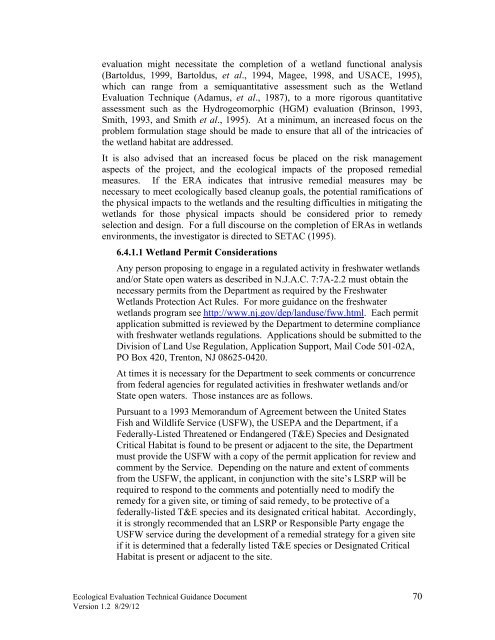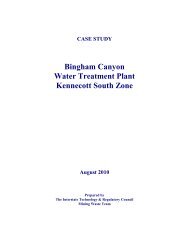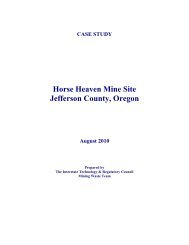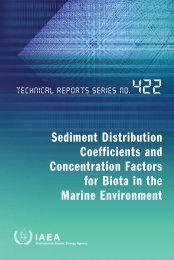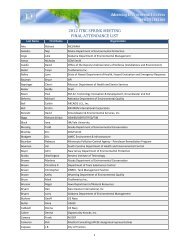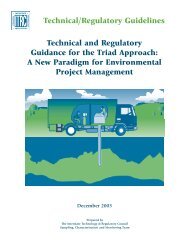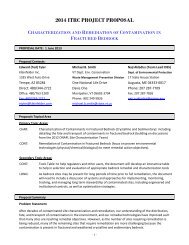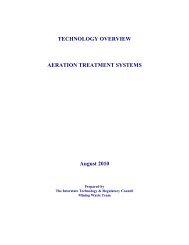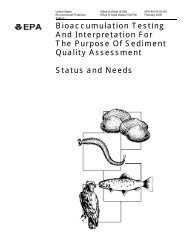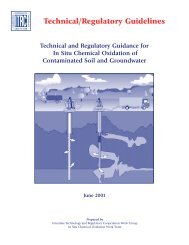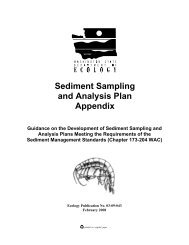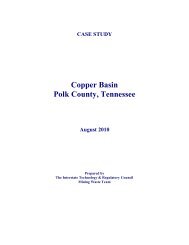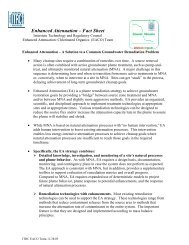Ecological Evaluation Technical Guidance - State of New Jersey
Ecological Evaluation Technical Guidance - State of New Jersey
Ecological Evaluation Technical Guidance - State of New Jersey
- No tags were found...
Create successful ePaper yourself
Turn your PDF publications into a flip-book with our unique Google optimized e-Paper software.
evaluation might necessitate the completion <strong>of</strong> a wetland functional analysis(Bartoldus, 1999, Bartoldus, et al., 1994, Magee, 1998, and USACE, 1995),which can range from a semiquantitative assessment such as the Wetland<strong>Evaluation</strong> Technique (Adamus, et al., 1987), to a more rigorous quantitativeassessment such as the Hydrogeomorphic (HGM) evaluation (Brinson, 1993,Smith, 1993, and Smith et al., 1995). At a minimum, an increased focus on theproblem formulation stage should be made to ensure that all <strong>of</strong> the intricacies <strong>of</strong>the wetland habitat are addressed.It is also advised that an increased focus be placed on the risk managementaspects <strong>of</strong> the project, and the ecological impacts <strong>of</strong> the proposed remedialmeasures. If the ERA indicates that intrusive remedial measures may benecessary to meet ecologically based cleanup goals, the potential ramifications <strong>of</strong>the physical impacts to the wetlands and the resulting difficulties in mitigating thewetlands for those physical impacts should be considered prior to remedyselection and design. For a full discourse on the completion <strong>of</strong> ERAs in wetlandsenvironments, the investigator is directed to SETAC (1995).6.4.1.1 Wetland Permit ConsiderationsAny person proposing to engage in a regulated activity in freshwater wetlandsand/or <strong>State</strong> open waters as described in N.J.A.C. 7:7A-2.2 must obtain thenecessary permits from the Department as required by the FreshwaterWetlands Protection Act Rules. For more guidance on the freshwaterwetlands program see http://www.nj.gov/dep/landuse/fww.html. Each permitapplication submitted is reviewed by the Department to determine compliancewith freshwater wetlands regulations. Applications should be submitted to theDivision <strong>of</strong> Land Use Regulation, Application Support, Mail Code 501-02A,PO Box 420, Trenton, NJ 08625-0420.At times it is necessary for the Department to seek comments or concurrencefrom federal agencies for regulated activities in freshwater wetlands and/or<strong>State</strong> open waters. Those instances are as follows.Pursuant to a 1993 Memorandum <strong>of</strong> Agreement between the United <strong>State</strong>sFish and Wildlife Service (USFW), the USEPA and the Department, if aFederally-Listed Threatened or Endangered (T&E) Species and DesignatedCritical Habitat is found to be present or adjacent to the site, the Departmentmust provide the USFW with a copy <strong>of</strong> the permit application for review andcomment by the Service. Depending on the nature and extent <strong>of</strong> commentsfrom the USFW, the applicant, in conjunction with the site’s LSRP will berequired to respond to the comments and potentially need to modify theremedy for a given site, or timing <strong>of</strong> said remedy, to be protective <strong>of</strong> afederally-listed T&E species and its designated critical habitat. Accordingly,it is strongly recommended that an LSRP or Responsible Party engage theUSFW service during the development <strong>of</strong> a remedial strategy for a given siteif it is determined that a federally listed T&E species or Designated CriticalHabitat is present or adjacent to the site.<strong>Ecological</strong> <strong>Evaluation</strong> <strong>Technical</strong> <strong>Guidance</strong> Document 70Version 1.2 8/29/12


